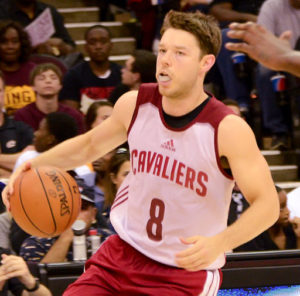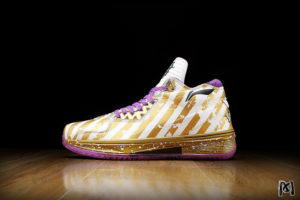NBA Champion Matthew Dellavedova is sitting on the bench in an empty high school stadium dressed in his gold-and-olive Australian colors.
He laces up a fresh pair of Peak kicks, and works on his dribble moves beyond the three-point arc as his voiceover narrates an unlikely rise to glory — and the shoe deal that came with it. “Success isn’t a straight line. There are going to be ups and downs,” says Dellavedova. “But the journey is worth it.”

If you’re a fan of the NBA, you know that Matthew was never an elite athlete. He went undrafted in 2013 out of Saint Mary’s, and scrapped his way to the league by way of a two year, $1.3 million contract (with only $100,000 guaranteed) on the far end of the Cleveland Cavaliers’ roster. But over the next few seasons, “Delly” became a cult hero for his scrappy defense and down-under charm. He famously played above his abilities defending Steph Curry in the 2015 Finals — and, in 2016, as the Cavs won their first NBA championship behind a heroic effort from LeBron James, he became an international celebrity alongside the rest of the roster. Dellavedova only averaged seven points and four assists during his title season, which makes him an unlikely sneaker star to most.
Not, however, for Peak, a Chinese sportswear manufacturer and one of many cross-Pacific companies embracing unlikely athletic endorsements. The “Delly 1” shoe launched in Australia on July 1, 2016, shortly before Matthew signed a four-year, $38 million deal with the Milwaukee Bucks.
In addition to Dellavedova, Peak holds the sponsorship rights of NBA players like L.A. Lakers center Dwight Howard and L.A. Clippers guard Lou Williams.
And Peak only represents a small part of the apparel pie in China. Fujian-based Anta Sports, which is now the third-largest sportswear manufacturer in the world by revenue, has inked Warriors 3-point maestro Klay Thompson, Celtics forward Gordon Hayward, and journeyman point guard Rajon Rondo. Li-Ning, founded by the gold-medalist gymnast of the same name, has worked directly with Shaquille O’Neal and Baron Davis. Together, these companies represent the frontlines of a new schism in the sneaker business. While Nike, Adidas, and Jordan have invested in the lucrative Chinese market for years, local companies are stepping up to compete with the foreigners.
“The ultimate goal is to gain legitimacy within China by creating a more global image and elevating the brand,” says Vincenzo La Torre, who covers fashion in Hong Kong and mainland China for the South China Morning Post. “Li-Ning in particular has hired designers and consultants from sportswear companies in the West to achieve that goal, but they know that China is their key market, and overseas expansion is only meant to strengthen their presence in China.”
This sea change began in 2012, when future hall-of-famer Dwyane Wade opted to sign a 10-year deal with Li-Ning.
As a result, as shoe scribe Nick DePaula wrote in a 2018 ESPN story, Wade opened the door for NBA players to explore their marketing opportunities beyond American shores. Financially, it made great sense on all sides; basketball is the most popular sport in China, and the NBA sends a yearly ambassadors’ convoy to the country to keep that relationship strong and healthy. Why not set up shop there permanently? Six years after the initial agreement, Wade re-upped with Li-Ning for a “lifetime” partnership with the brand. He could’ve gone anywhere, and he chose Beijing.

That same thinking seduced Klay Thompson when his deal was set to expire with Nike. DePaula reported that Anta offered him $2 million a year, and a guarantee he’d be able to personally design his own line of footwear. That was a hard offer to decline.
“I knew with Anta, I would have so much input creatively. I was going to hopefully be the Michael Jordan one day of Anta,” Thompson told DePaula, later adding: “Knowing that I could be really big in China — that was really cool to me. The shoe market sometimes is overflooded in the States, and I thought, ‘Well, why not branch out and be global?'”
Thompson has fulfilled his end of the bargain.
Some of the Anta shoes bearing his name are truly radical — like the newsprint-wrapped KT4s — which sold out almost immediately when they hit the streets in the East Bay. But despite all of that momentum from some high-profile players, La Torre says that Western manufacturers still rule the roost in China. Nike, in particular, posted a $1.38 billion revenue in Greater China in 2018, the majority of that derived from sneaker sales —and, given the numerous, billowing Steph Curry banners around downtown Shanghai, it doesn’t seem like their push into the mainland will taper off anytime soon.
But Li-Ning doesn’t appear to be taking that lying down. “What Li-Ning has is a unique brand story and it mirrors China’s desire to rise again in the global stage,” says Tian Weizhang, who covers the Chinese fashion industry at Women’s Wear Daily. “Li-Ning has been betting big on fashion and streetwear style with shows in New York and Paris. In this sector, Li-Ning has a smaller gap with global players and the brand knows what ticks with the Chinese audience. And the brand has been learning from Nike and Adidas, by doing designer collaborations with cool brands outside China to build up its desirability among the fashion consumers, making the gap smaller and smaller.”
The other movement working in favor of Chinese footwear?
The roiling tide of patriotism that gripped the mainland following the NBA’s Hong Kong flap. For the unaware, last summer Houston Rockets GM Daryl Morey made a tweet in support of the pro-democracy protests that had rocked Hong Kong following the proposal of a dubious, pro-Beijing extradition law. The Chinese Communist Party, which is famously sensitive to any perceived slights directed at its authority by American investors, and is especially sensitive about issues pertaining to Hong Kong, Taiwan, and Tibet, quickly denounced the NBA. Games were blacklisted from TV, local sponsorships dropped out, and Morey became a surprising cult figure within Hong Kong activist circles. The NBA did its best to walk back those sentiments, but the damage had been done. CNBC reported that the league stands to lose as much as $400 million due to cancelled business deals, and in late 2019, Li-Ning’s stock value started to grow a tick faster than Nike’s.
According to La Torre, the company has responded by leaning all the way into the fervency. He describes Li-Ning as riding a wave of “nationalist fashion” — enjoying its status as one of the premier outfitters for a young, energetic, and enthusiastically pro-China wave of young consumers. At a recent exposition at New York Fashion Week, two male models, dressed in revolutionary red, walk down the aisles in windbreakers printed with the Mandarin characters for “Middle Kingdom.” Feng Chan Wang, a renowned Beijing designer, offered a white T-shirt with block lettering that reads, “Made in China” — reclaiming the frequently-derisively-uttered phrase into a point of pride. In general, La Torre doesn’t expect the Hong Kong controversy to have a particularly pervasive effect on the relationship between Chinese consumers and foreign manufacturers, but it remains emblematic of the unexpected tensions of a globalized market: American athletes signed to a brand that’s riding off of a lucrative, distinctly non-American message.
Western sneakerheads don’t buy a lot of Chinese shoes.
That isn’t necessarily for a lack of trying; the availability just isn’t there. Walk into any FootLocker, and you’re not going to see many Antas or Li-Nings in stock. “Retailers in the US would rather push Nike or Adidas,” explains Drew Whitcomb, who runs the sneaker reviews hub WearTesters. “It’s annoying for the fans of the players.”
Instead, when Whitcomb needs to get Chinese products in hand for critical purposes, he typically either reaches out directly to the distributors, or relies on a few online storefronts he trusts. WearTesters has reviewed hundreds of foreign shoes on its YouTube channel, and Whitcomb says those videos generally do pretty well for him both due to his company’s sizable foothold in Asia, as well as general curiosity. The scarcity of these shoes in the West has engendered a certain obsession in sneaker-collecting corners, though some Chinese companies are beginning to streamline the process of shipping their footwear overseas. Li-Ning recently broke ground on an Amazon shop, allowing Wade fans all over the world to take home the WoW 8s. For his part, Whitcomb believes that Chinese manufacturers stack up with any other sneaker brand in the world. “The materials they use to build their shoes are basically the same as the US brands,” he says. “The vast majority of the world’s shoes are built right there in China, so the expertise is there.”
In fact, Whitcomb says, the only noticeable difference an American customer might find in a pair of Delly 1s is some added attention to the realities of basketball culture in China. 300 million people in the country play the game, and most do not have access to indoor hardwood courts. As such, Chinese basketball shoes are built with an extra-durable layer of rubber on the outsole, so they can hold up against weather, heat, and the hard concrete of playground hoops. (They also tend to be built a little bit wider, matching the most common foot shape in east Asia.) But those are all superficial concerns. Considering that Klay Thompson wears his Antas during every game he plays in the Chase Center, clearly, Chinese footwear has been thoroughly NBA-tested.
If these Chinese brands do eventually make a full-on push into the American market, it would be a big further step in what seems to be a greater economic trend sweeping the country. As China continues to consolidate influence as a global superpower, its business leaders have opened up factories and biotech labs in the US. As of last year, China has put $145 billion into the American domestic product. Who’s to say that fashion can’t be next?

